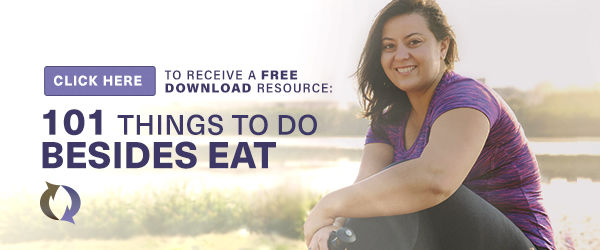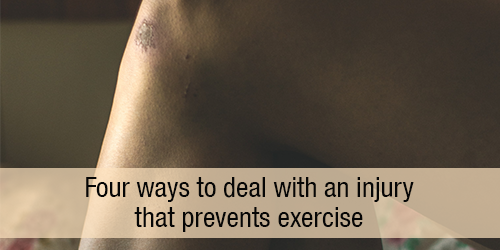Sometimes people I work with have concerns because they are injured and can’t exercise. Whether they have an acute injury (like Cindy’s fracture below), knee pain, or chronic osteoarthritis, an injury can not only disrupt your physical activity but throw you out of balance.
I exercise because I need to!
Since I quit dieting many years ago, I no longer exercise because I have to, but because I need to. Exercise provides countless benefits beyond burning calories. Yoga keeps me balanced and calm. Hiking keeps me energetic, productive, and connected. Weight training keeps me strong. And pickleball is just fun!
When I struggled with a right rotator cuff injury for nine months followed by surgery a number of years ago, I was concerned about the potential effects on my energy and mood from not being able to exercise—and so was my husband who had to live with me!
I recalled an #askamihungry question I had received from Cindy. Her concerns were a little different but it raised some important issues while recovering from an injury.
I can’t exercise!
“I’ve been following you for a while and have now run into a problem. I broke my ankle in two places and I’m not able to exercise for 4-6 weeks. I can eat mindfully and manage eating when I am not hungry, but I fear without exercise I won’t be able to keep weight off. Any ideas?”
I figured our Facebook community would have some great insights—and they did! We received dozens of comments that I grouped according these four themes:
- Don’t focus on weight; exercise isn’t about that anyway.
- Taking a break for exercise once in a while is a good thing.
- Find something new to do.
- Trust your body; it knows what it needs to heal.
Four ways to deal with an injury that prevents exercise
1. Don’t focus on weight; exercise isn’t about that anyway.
Too often people use exercise to earn the right to eat or pay penance for eating. That’s a very narrow view of the tremendous benefits that exercise offers. Here’s what others said:
Celia: Working out doesn’t earn you more calories.
Emilie: Sometimes you gain weight. It isn’t the end of life. Focus on getting better.” She added, “Rest isn’t about sitting on the easy chair waiting to heal; active recovery will make getting back to normal much easier.
Charlene: I’d like to offer a broader question than ‘how do I keep from gaining weight?’ to ‘how do I exquisitely care for myself during this time of injury, pain, and healing?’ The three questions from the Am I Hungry? Mindful Eating Program, What do I want? What do I need? What do I have?, can also be applied to the physical, mental, and spiritual aspects of our lives. You’ll find answers and strength during this unexpected event regardless of what happens to your weight. It’s about so much more than numbers on a scale.
Debbie: Sometimes I get a client that struggles with this issue in eating disorder work. What I might ask is, what is this about if it wasn’t about the weight of the body? If it is about physical health and anxiety reducing, we focus on tools to reduce anxiety (or other difficult emotions like feeling helpless etc.). I’d ideally have a physical therapist work with her to do what’s safe for that injury stating that the goal is to be well enough sooner to move again.
(Debbie also shared an article called 12 Signs You’re Exercising Too Much and said, “This article is very personal for me, because I struggled with compulsive exercise for years. Today, I don’t work out or exercise; I move my body. I move to cultivate clarity, creativity, and energy.”)
2. Taking a break from exercise once in a while is a good thing.
Most experts agree that taking a break from your usual routine is actually a good thing. It allows your body to rest and recover, with surprisingly little loss in fitness (depending on the length of time of course).
Allen: I was told no running for the next 2 to 3 weeks. Just eat good real food and watch the amount.
Donna: I did a relaxation meditation with a client who had to quit running/exercising temporarily, too. I incorporated in the meditation a visualization of her preparing to run, warming up, running, and even getting into the “zone.” Then we proceeded with her cooling down in the visualization. She found it effective.
3. Find something new to do.
This “limitation” may actually turn out to be an opportunity to discover other activities you enjoy—or at least learn to appreciate your usual activities even more!
Emilie: When my friend broke her ankle, she found that doing everyday things with the cast was a lot of exercise. Also, she could still lift arm weights sitting down which was good for overall strength.
Heather: Do upper body weights and try a stationary bike once it starts to heal.
Camerin: When I had foot surgery, I rented a scooter to rest my bent knee on to get around. It was much easier than crutches and I was pretty mobile on our hardwood floors and outside. You’ll use muscles you never knew you had!
Michele: Are you able to swim?
4. Trust your body; it knows what it needs to heal.
I love the message, “Trust your body!” which is what Am I Hungry? Mindful Eating Programs is all about: Learning to listen to and trust your body’s wisdom. Pain is a sign that something is wrong, so pay attention and give your body time to heal.
Melissa: Your body will adjust to less exercise. Focus on being mindful, not on your weight.
Sumner: Trust your body and your hunger. Move in ways that feel good and are safe. Know that it’s OK even if your weight does shift some; it doesn’t mean you’re doing anything wrong.
Debbie: What’s so terrible about rest and not exercising for a period of healing time? Whose voice gets to be in charge of the healing plan? The inner critical parent voice or the gentle firm good parent voice?
Cindy replied:
“Thanks to everyone who responded! I decided the most important thing is for me to heal. If I don’t heal correctly, it won’t get better. So I’m going to focus on upper body exercises and following the Am I Hungry? program. Thanks again!”
As for me, after my shoulder surgery, I switched to walking, doing lower body stretches and core exercises, and going to physical therapy. When I was able to re-start my favorite activities, it was with a renewed sense of appreciation for what I’m able to do!
This article has been updated from a previously published version.
Enjoyed this article? Here are three more to help you:
Change Your Thoughts about Exercise
Not getting enough exercise? Lower the Bar
Diet and Activity Trackers: The Next Generation of Misused Tools



4 thoughts on “I’m injured and I can’t exercise!”
Oh, Thank you all for your comments. It could not have come at a better time. I had to stop the guilt trip I had dropped on myself. I had abdominal surgery and was laid up for two weeks, at the same time my step Dad became critically ill and ultimately died within the next two weeks. I was in a tailspin. This blog has given me direction and calm. Trust my body. it will tell me what it needs. Spend the time I need healing physically and emotionally. Do something else if I need to! It has worked in the past and will again in the future!
Joyce
Wow Joyce! That is a lot to go through. I’m glad that you will not add, “Beat myself up for not exercising like I was” to your list. Trust your body and take good care of yourself!
Comments are closed.